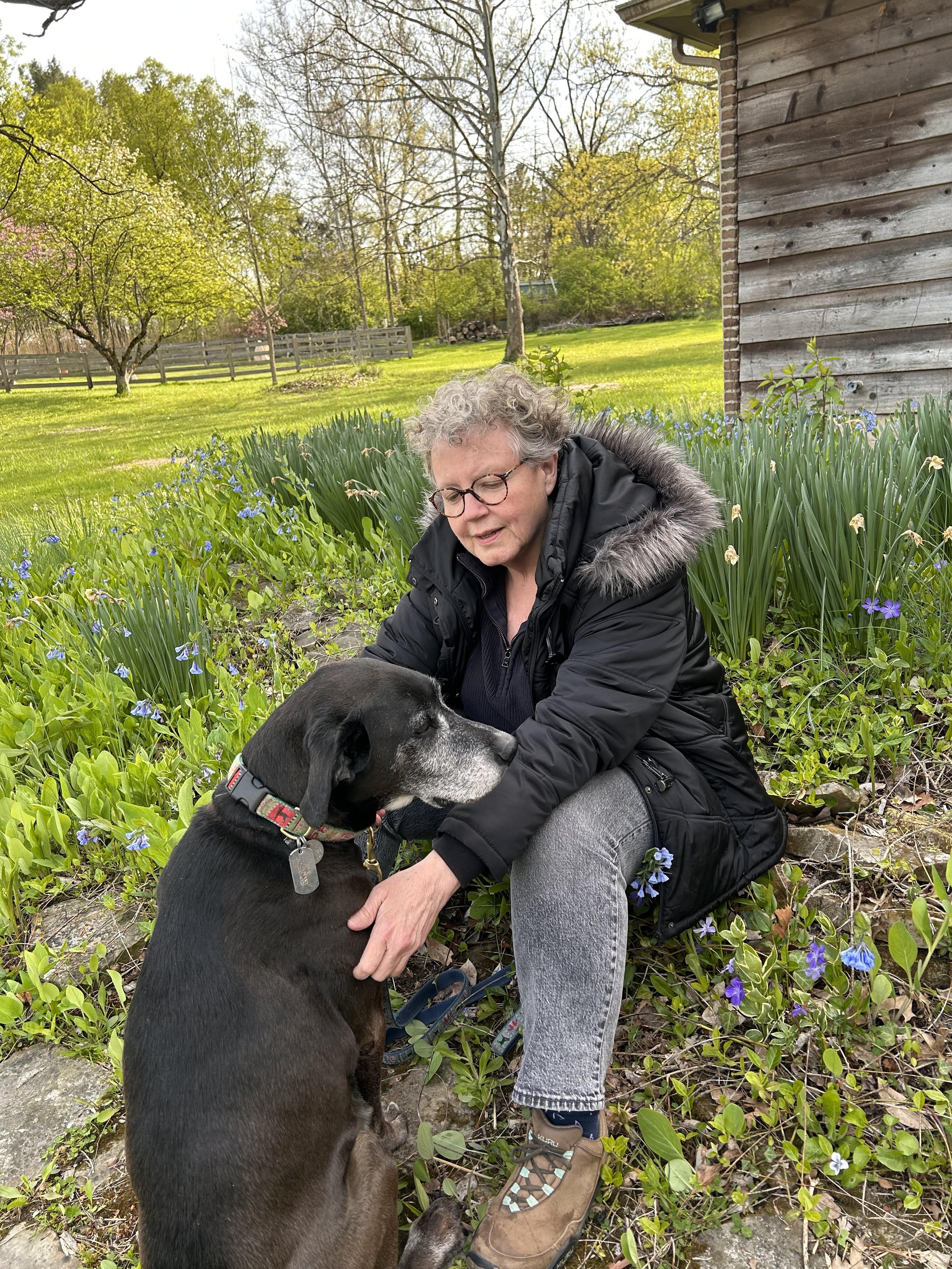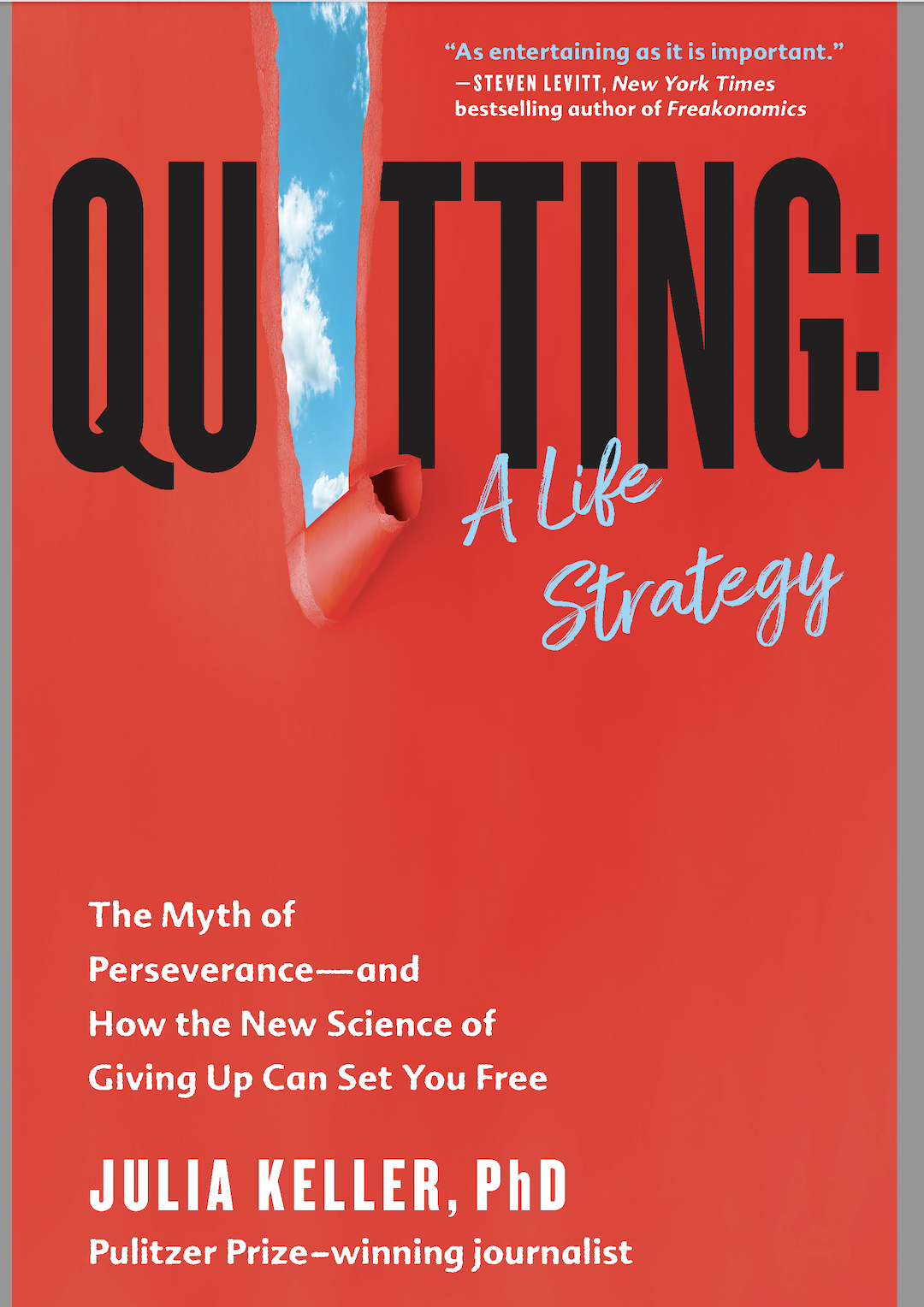Q & A: Pulitzer Prize-Winning Writer Julia Keller on the Virtues of Giving Up
/In her new book Quitting: A Life Strategy: The Myth of Perseverance — and How the New Science of Giving Up Can Set You Free (Grand Central Publishing/Balance), Julia Keller challenges faith in slogans like “Winners never quit and quitters never win!”
Keller moves beyond her own experience — PhD in English, Pulitzer Prize-winning journalist, novelist of best-selling mysteries set in her native West Virginia — and blends sociological and scientific evidence with stories ranging from a tenured college professor who became a Franciscan monk to a high school athlete who left her team.
Reflecting her wide-ranging curiosity and associative mind, Keller embeds cultural references and sharp intellectual insights into Quitting, from Nobel Prize-winning economist Daniel Kahneman’s Thinking, Fast and Slow to Herman Melville’s Bartleby, the Scrivener, to the popular TV show “Abbot Elementary.” Keller discussed the origins and inspiration behind Quitting with the National.
Q: What a surprising match of subject and author! Between a Ph.D. in English and a Pulitzer Prize for Feature Writing, you have toggled between journalism and literature. Have you quit anything – or did your interests and enthusiasms just evolve?
Q: I quit all the time! But always with great trepidation and ominous forebodings that I’m making a tragic mistake. I come from a rather melodramatic family, and thus trepidation and forebodings are twisted right into the strands of my DNA. Seriously, though, I’ve quit a great many things: I quit grad school twice, but I did return just long enough to earn that Ph.D., and I’ve quit jobs, friendships, religious beliefs, political convictions. One of the crucial points in my book is that quitting is always hard, for everybody. Quitting is a crucial crossroads – you stay or you go. And neither choice may work out as you hope it will. But it’s the making of the choice, not the outcome, that matters. The act of quitting is positive. It requires a belief in abundance.
Q: Did the ‘Great Resignation’ prompt you to grapple with the idea of quitting?
A: To a certain extent, yes. I was already pondering the mysterious hold that the idea of grit exerts on our culture at just about the time when the pandemic hit – and people began giving up jobs right and left. Grit and perseverance suddenly weren’t so hot anymore. It was acceptable to resign from jobs that were less than satisfying, because we were reminded daily of life’s fragility and brevity. To my dismay, that freedom hasn’t really lasted; already the idea of hanging in there and toughing it out – even if a job or a relationship is killing your soul – seems to have returned.
Q: Can you explain the spark for Quitting and how you decided to structure the book?
A: I envisioned the book as a sort of meditative mashup of memoir, reportage, neuroscience primer, cultural exegesis, and political manifesto. The original catalyst was a very painful personal memory of my disastrous attempt to go to grad school at West Virginia University when I was nineteen years old.
As I describe in the Introduction, after less than a month I was in bad shape: homesick and heartsick, and dangling helplessly at the end of my emotional tether.
But I was afraid to withdraw from school because I’d be called a quitter. Later, I wondered why – why did the word make me cringe with shame? Quitting is a field report from my journey toward answering that question. I explored the contemporary scientific research that is making great strides in discovering how and why our brains decide to abandon one path for another. I let people who have quit things tell their stories. And I reflected upon the history of grit: Why in the world did we ever let ourselves be persuaded that changing course – quitting and restarting in another direction – is such a bad thing? I have great respect for Angela Duckworth, who wrote the very popular book Grit, but I think she’s dead wrong when she identifies grit as the sine qua non of high achievers. I think nimbleness and flexibility are far more important.
Q: How did you decide to add mini essays labeled ‘White Flag Moments’ and ‘Permission Slips’ add to your narrative?
A: I love sidebars and different voices and multiple points of entry in a story. And I wanted a way to include quick hits from people about the times when they gave up on something, about the moment of decision when they took a chance and walked away. I’m drawn to books that include dynamic narrative elements, and I hoped these would enrich and enliven Quitting.
Q: You write that quitting “doesn’t have to be a full stop,” suggesting that there are different ways to quit. In your research, what did you learn about styles of quitting?
A: So much! I received a crash course in quitting from the people I interviewed. For some, the impulse to quit was like a bolt from the blue, and they exited with a theatrical flourish. For others, it was a more incremental withdrawal. I recommend what I call “quasi-quitting,” which is a pause and a pivot: taking stock of where you are, and where you want to be, and coming up with a patient, methodical strategy to get you there. Quasi-quitting is not the same as “quiet quitting,” that naughty, pandemic-inspired trend of doing very little on the job and hoping the boss won’t notice. Quasi-quitting is about doing more work, not less: You have to imagine where you want to be and how to get there, without ignoring current responsibilities. Bottom line: Quitting is not for sissies!
Q: You seem to reject the steps and principles in embedded in most self-help books?
A: I’m not a fan of self-help books, for reasons that I hope become clear in the course of Quitting – and not just because those books always tend to sell fantastically well, and we authors are a jealous lot. I just think they’re insidious. They suggest that your fate is entirely up to you. Your destiny is in your own hands. And if you fail – why, it’s because you didn’t work hard enough. You didn’t follow the plan. And you quit.
But the truth is, people struggle with unique burdens in this life, burdens not of their own making. Some are born to multi-generational poverty, or born with physical, intellectual, or emotional handicaps. Or born black or brown in a predominantly white culture.
Following the simplistic ethos of a self-help book – that we craft our future by following whatever behavioral steps the book recommends – ignores the grim and oppressive reality of racism, misogyny, ageism, homophobia, and transphobia, and makes all of us less willing to fight for a more just society, and to work to lessen the vast income inequality gap that presently bedevils us.
Q: Do you have thoughts for those people who cannot bring themselves to quit a something – job, relationship, pursuit?
A: A couple of things: First, quitting a job might not be the right thing to do. Or quitting a job right now might not be right. And second: It’s important to remember that Quitting isn’t only about jobs and marriages. I try to consider all kinds of quitting, including philosophies and ways of being in the world. I grew up in a rather cynical household, for instance, and one of my epic struggles as an adult has been to shed that negativity, to not dwell in the shadowy forest of “It’ll never work out and if you think it will, you’re a sucker.” Quitting an outlook can be more difficult than relinquishing a tenured professorship or a multi-year marriage.
Q: What about those who financially cannot afford to quit a job?
A: I’d go back to the idea of the quasi-quit. Quitting doesn’t have to mean walking out and then wondering how you’ll make the mortgage. It doesn’t have to be an on-off switch. It can be a rheostat dial. If you can’t change everything that’s wrong with a position, you can perhaps change a few things, here and there.
Q: And what about those with addictions? Those who just cannot quit?
A: One of my favorite chapters in Quitting is an interview with Dr. Michael Bruchas, a brilliant and compassionate neuroscientist at the University of Washington who specializes in the study of addiction. He and his team are working very hard to identify the chemical transmitters in the brain that are involved in addiction, an effort that one day may result in the development of pharmaceuticals that can interrupt the circuit – and cure us of harmful cravings. As he notes, a person suffering from clinical depression quits too easily, while an addict doesn’t quit at all. Our brains are dauntingly complex, and quitting is at the core of our humanity.
Q: At any point in the creation of this book, were you so discouraged and frustrated that you quit the project?
A: Dozens and dozens of times. Quitter – c’est moi.











